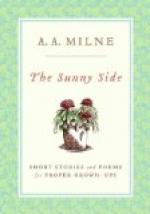And so on, down to that magnificent last verse:
The skylark triumphs from the blue,
Above the barley fields at Loo,
The blackbird whistles loud and clear
Upon the hills at Windermere;
But oh, I simply LOVE the way
Our organ-grinder plays all day!
Lord Poldoodle rises to introduce Mr. Montagu Mott.
“Mr. Mott,” he says, “is, I am told, our leading exponent of what is called vers libre, which means—well, you will see what it means directly.”
Mr. Mott, a very ugly little man, who tries to give you the impression that he is being ugly on purpose, and could easily be beautiful if he were not above all that sort of thing, announces the title of his masterpiece. It is called “Why Is the Fat Woman’s Face So Red?” Well, what else could you call it?
Why is the fat woman’s face so red?
Is it because her stays are too tight?
Or because she wants to sneeze and has lost her pocket
handkerchief?
Or only because her second son
(The engineer)
Is dying of cancer.
I cannot be certain.
Yet I sit here and ask myself
Wonderingly
Why is the fat woman’s face so red?
It is generally recognized that, in Mr. Mott, we have a real poet. There are loud cries of “Encore!” Mr. Mott shakes his head.
“I have written no more,” he says in a deep voice. “I have given you the result of three years’ work. Perhaps—in another three years—” He shrugs his shoulders and walks gloomingly out.
“Such a sweet idea,” says Lady Poldoodle. “I sit here and ask myself—wonderingly! How true! How very true!”
“I couldn’t quite follow it, dear,” says her neighbour frankly. “Did he marry her after all?”
Lord Poldoodle, looking slightly more cheerful, gets once more on to his legs.
“You will all be very glad to hear—ah—you will all be sorry to hear that we have only one more poet on our list this afternoon. Mr. Cecil Willow, the well-known—er—poet.”
Mr. Willow, a well-dressed young man, fair and rather stout, and a credit to any drawing-room, announces the subject of his poem—Liberty.
“Liberty, what crimes have been committed in thy name!” murmurs Lord Poldoodle to himself.
LIBERTY
There were two thrushes in a tree,
The one was tamed, the other free.
Because his wings were clipped so small
The tame one did not fly at all,
But sang to Heaven all the day—
The other (shortly after) flew away.
There were two women in a town,
The one was blonde, the other brown.
The brown one pleased a Viscount’s son
(Not Richard, but the other one)
He gave her a delightful flat—
The blonde one loved a man called Alfred Spratt.
There were two Kings on thrones of gold,
The one was young, the other old.
The young one’s laws were wisely made
Till someone took a hand-grenade
And threw it, shouting, “Down with Kings!”—
The old one laid foundation stones and things.




